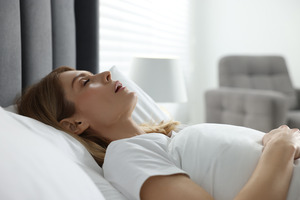
Untreated sleep apnea can have some very serious consequences, such as an increased risk of heart attacks. To make matters worse, there are several factors that could end up making the problem more severe. If you want to overcome your sleep disorder, it’s important to be aware of anything that might be contributing to it. Below, you’ll find a list of 5 major factors that are known to potentially worsen sleep apnea.
1. Sleeping Position
When you sleep on your back, gravity can cause your tongue to fall toward the back of your throat, potentially blocking the flow of air. Such obstructions of the airway can easily lead to sleep apnea episodes. Sleeping on your side can go a long way toward reducing your sleep apnea symptoms. If you’re having trouble making the change, try attaching a tennis ball to the back of your pajamas; this will encourage you to sleep on your side by making it uncomfortable to lay on your back.
2. Obesity
The majority of sleep apnea patients are also obese. When you’re overweight, there’s a greater chance of fat deposits in your neck collapsing while you sleep and interrupting your breathing. The more weight you gain, the worse your sleep apnea is likely to become. Conversely, losing weight can make your disorder less severe.
3. Alcohol Before Bed
If you have sleep apnea, it’s highly recommended that you stay away from alcohol for at least a few hours before you plan on going to bed. This is because alcohol can have a relaxing effect on your muscles – and unfortunately, this includes the muscles around your airway. As such, giving up drinks in the evening could be the key to improving your ability to breathe properly during the night.
4. Your Age
Sometimes the simple process of growing older is enough to make sleep apnea worse. As you age, the muscles around your airway start to lose their tone, thus increasing the chances of an airway obstruction. Obviously, you can’t stop yourself from getting older, but you can try to mitigate the effects of aging by maintaining healthy habits, such as exercising at least a few hours before bedtime.
5. Certain Medications
Muscle relaxants, opioids, and benzodiazepines are all examples of medications that can cause the muscles in your throat to relax, thus contributing to sleep apnea. You may want to speak to your physician to see if the medications you are currently taking might be making your sleep disorder worse (as well as what can be done to address the problem).
When you speak to your sleep dentist about your options for treating sleep apnea, they can let you know about any other risk factors that might be contributing to your disorder and help you devise a plan for dealing with them.
About the Author
Dr. Sara Saba went to the University of Maryland at College Park for her dental education. She loves being able to work with her hands while also helping others. She offers Vivos DNA oral appliances as a conservative way to treat sleep apnea symptoms. To schedule a consultation with Dr. Saba at Exceptional Dentistry Pain & Sleep Solutions in Silver Spring, visit her website or call (301) 460-3331.
